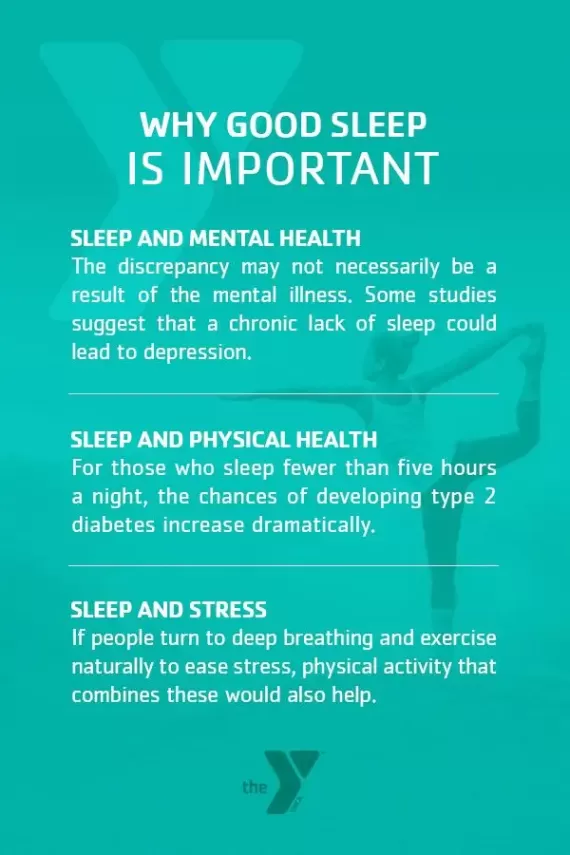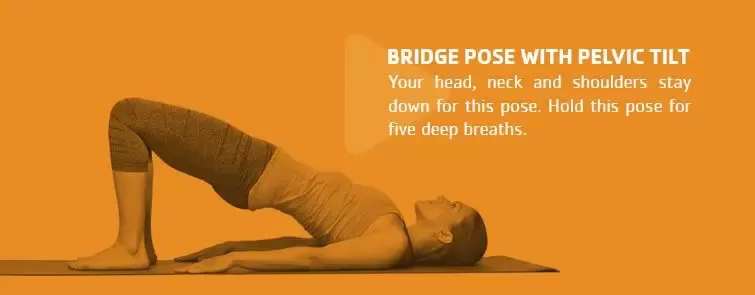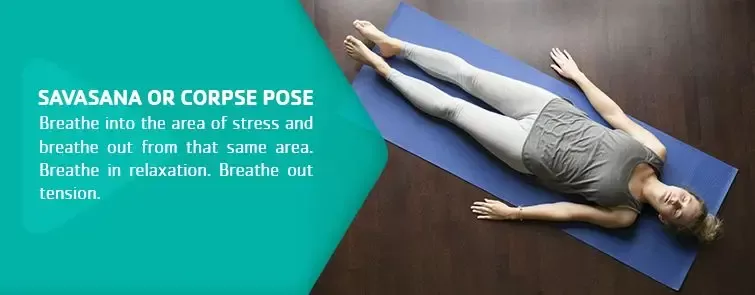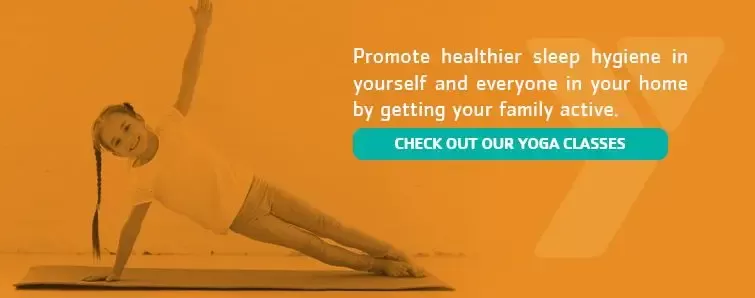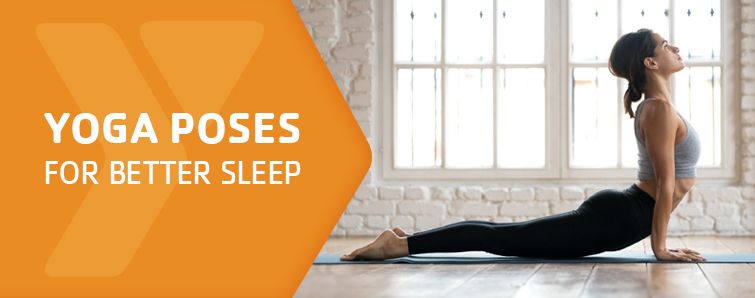
Yoga Poses for Better Sleep
You're not alone in waking up unrefreshed after inadequate sleep. Everyone has a bad night's sleep occasionally, but if you find yourself regularly missing out on the recommended seven to nine hours of sleep a night, you could harm your physical and mental well-being. The same can even happen with growing teens. Discover yoga to fall asleep and help you get the restful slumber your body craves. With practice, you can find yourself waking up refreshed and ready to get yourself and your family started on a new day.
Why Good Sleep Is Important
Your body relies on a good night's sleep every night for prime mental and physical health. Without enough sleep, you cannot function at your best. In the short term, you may feel tired and have problems with focus. Over time, the problems caused by not enough sleep add up.
1. Sleep and Mental Health
Sleep deprivation occurs more frequently among people with mental illnesses. In psychiatric practices, up to 80% of patients reported sleep problems. Compare that number to only 18% of all Americans.
The discrepancy may not necessarily be a result of the mental illness. Some studies suggest that a chronic lack of sleep could lead to depression. In 1989, researchers interviewed 1,000 adults. Those who reported insomnia were four times more likely to have developed depression by 1992, at the follow-up interview. Another study of twins showed sleep troubles tended to precede mental illness development. Insomnia appeared before symptoms in 69% of patients with depression and 27% of those with anxiety disorders.
2. Sleep and Physical Health
Sleep has effects on your body as well as your mind. Multiple studies have connected chronic illnesses to not sleeping enough. Everything from diabetes to obesity to colds can relate to whether you get adequate rest.
For those who sleep fewer than five hours a night, the chances of developing type 2 diabetes increase dramatically. However, people with diabetes who get enough sleep, have an easier time controlling their blood sugar.
Even if you sleep more than five hours a night, you still could have problems if you regularly get between six and seven hours of sleep. Those who slept this amount — slightly less than the seven to nine hours recommended — had a higher risk of developing calcification in their coronary arteries, which could lead to a heart attack.
If you want to lose weight, hit the sheets instead of the snack bar. One study showed those who slept more than eight hours a night had lower body fat than participants who got less sleep. Additionally, people who got fewer than six hours of sleep nightly were more likely to have higher body weights among those in the study.
Even the developing a cold could have a link to sleep. For study volunteers who slept fewer than seven hours a night, the chances of developing a cold were three times greater compared to those who averaged more than eight hours of sleep. While scientists need more study of the matter, early results of current research appear to link a lack of sleep to reduced ability to resist infections. This connection between sleep and infection resistance could explain the findings of people who get less sleep being more likely to get colds.
3. Sleep and Stress
While everyone experiences occasional stress, chronically feeling pressure could harm your physical and mental health. In a survey conducted by the Huffington Post, 91% of respondents reported feeling stress during the last month. A majority, 77%, felt stressed regularly.
Stress has multiple sources for people, the most common being work or a lack of work. But when the survey asked about specific stress triggers, 66% of people said a lack of sleep ranked highest. The second highest worry was about weight. As already seen, a lack of sleep correlates to higher body weights. Sleeping more could help these top two stress triggers, ultimately improving sleep.
Having stress prevented many people from getting to sleep or staying asleep. The resulting insomnia added to their stress levels the following day. To break this cycle, 46% of people reported exercising while 55% did deep breathing. Both responses ranked slightly below the top stress reducer of calling a friend, which had 56% of respondents report.
If people turn to deep breathing and exercise naturally to ease stress, physical activity that combines these would also help. Yoga may be a way to reduce stress by getting your body moving and helping you to practice deep breathing. Lowering stress could also help you to sleep better at night by making it easier to shut off the worries in your mind.
Sleep Hygiene
If sleep is so vital, why do so few people get enough? Work worries, family obligations, smartphones, television and computers all vie for attention late at night. With so many competing concerns, falling asleep becomes difficult. You need to treat sleep just as you would any other part of caring for your well-being. Good sleep hygiene can improve your rest and help you get enough sleep to feel alert, not groggy, the next day.
Good sleep hygiene means creating an ideal environment for sleep in your bedroom and setting a sleep schedule. Go to bed at the same time each night and wake up at the same time in the morning, even on weekends. Changes in your sleep schedule can make waking up harder.
To keep your bedroom comfortable, lower the temperature and keep it dark. Do not keep a TV or computer in your bedroom to avoid distractions. Try to shut off your smartphone or don't use it in bed. As difficult as giving up your smartphone at night is, your sleep is more important than sending a text message at 1 a.m.
During the day, avoid stimulating substances like caffeine and nicotine in the afternoons and evenings. The same goes for alcohol, which can disrupt your sleep pattern. You may feel sleepy after a drink, but you will soon wake up after just a few hours. Since you have disrupted your normal sleep cycle, you won't feel as rested.
Physical activity can also help sleep. Aerobic activity that gets your heart pumping during the day can promote better sleep at night. Slowing down with meditation, deep breathing or gentle stretching before bed can also help you rest. Yoga can fulfill either requirement, depending on the type you choose. Certain yoga stretches for sleep will help you relax, improving the quality and length of your sleep.
Why Choose Yoga for Better Sleep?
Adding yoga to your life can help you sleep better and connect more with how your body moves. When it comes to practicing yoga, 94% of those who do it cite wellness as the reason. The reported results show yoga can have a positive benefit on your well-being. For example, improved sleep occurred in more than 55% of people who did yoga, and 85% of people had less stress.
While most people think of yoga as a series of slow, relaxing motions, it can also be a physically demanding workout. For example, a power yoga class offers advanced poses and techniques not seen in beginner level classes, giving you a more intense workout. However, if you want an easier series of motions, regular yoga or gentle yoga classes would be a better choice.
Choose any yoga class you like during the day. Whether you do a more vigorous or relaxing yoga will not matter as long as you get moving. Strenuous exercise right before bed, however, could wake you up too much to sleep. Should you need relaxation right before bed, though, opt for quiet, gentle yoga moves for sleep that help ease your body into a relaxed state.
Bedtime Yoga Poses
If you don’t enjoy restful nights, try these yoga poses for good sleep. Imagine how much better you'll feel if instead of watching TV until you fall asleep and stumbling into bed exhausted, you enjoy some quiet time to yourself. With these yoga poses to do before bed, you will enjoy stretches and deep breathing to reconnect to your body and slow yourself down as you prepare for sleep.
For the best results, carefully follow the timing and breathing instructions for all these poses. Yoga emphasizes mind-body connection, and deep breathing while focusing on certain parts of your body helps create that link. Deep breathing can also help you to release some stress you still hold in your body from the day. Getting rid of this stress makes falling asleep easier. Helping you to ease stress is just another way to use yoga to fall asleep.
1. Happy Baby Pose
While lying on your back, bend your knees and reach your hands toward your big toes or the outside edges of your feet. If you cannot reach your feet, you can reach anywhere along the outside of your legs. Gently pull your knees down towards the bed. Your head, neck and shoulders stay down for this pose. Enjoy holding the pose for five deep breaths. You can rock your body side to side if it feels good.
2. Bridge Pose With Pelvic Tilt
Lie on your back with both feet flat on the bed and your knees bent. Place your arms at your sides with your palms down. Press into your feet and shoulders — not your neck — and lift your pelvis slowly toward the sky. If you are feeling unstable, move your feet back closer to your seat. Your head, neck and shoulders stay down for this pose. Hold this pose for five deep breaths. If you wish, you may take your hands to the low back to provide support.
3. Butterfly Pose
Sit up with your knees bent and the soles of your feet together. First, practice sitting up tall with your spine straight. Take five deep breaths here before folding forward over your legs. You might like to grab hold of your toes or upper feet and pull them gently towards your face. Stay here for an additional five deep breaths.
4. Supported Child’s Pose
Experiment with a combination of blankets and pillows for this gentle pose. Place a pillow vertically on the bed or roll up a blanket and place it on top of the pillow for more height. Start on your hands and knees in a tabletop pose with your belly above the pillow and blankets. Spread your knees a little wider than your hips and slide the edge of the pillows towards you. Rest your belly and chest on the pillows or blankets.
Allow your head and neck to relax either by placing your forehead on the pillow or turning your head to one side and resting your cheek down. If you do this option, then turn your head and switch to the other cheek half-way through. Allow your arms to drape down to your sides. Stay here for approximately five minutes.
5. Savasana or Corpse Pose
This is usually the final pose of a yoga sequence, and its importance is easily overlooked. Lie down on your back with your legs extended straight out. Place your arms long at your sides, palms face up or down, or rest your hands on your stomach. Allow your feet to fall apart in opposite directions. Allow your back body to feel heavy and sink into the bed. Relax your face and jaw, letting your lips separate. Close your eyes and focus on your breath.
Notice the rise and fall of your belly as you breathe. Just observe the breath and any activity in your mind. There is no need to cling to any thoughts that may arise — just acknowledge them and move on. If you wish, you can add a body scan and focus your attention from the tips of your toes to the top of your head. Take your time. Notice if you are holding any tension anywhere. If you find a spot of stress, see if you can focus your breath on that particular area. Breathe into the area of stress and breathe out from that same area. Breathe in relaxation. Breathe out tension.
There is no time limit for this pose, but because this final pose is so comfortable, either do it in bed or set an alarm in case you fall asleep while doing the corpse pose.
A Healthy Body and Mind Begin With Great Sleep
Promote healthier sleep hygiene in yourself and everyone in your home by getting your family active. Whether you choose physical activity during the day, yoga poses to promote sleep before bed or both, we're here for you.
Check out our yoga classes. These classes are free with your Y membership, and you don't need to sign up. Just show up for a way to add yoga to your life and get better sleep.
With better sleep, you can enjoy better physical and mental health and lowered stress levels. Sleep ties so tightly to your well-being that you must make getting great sleep a priority for yourself and your family.
